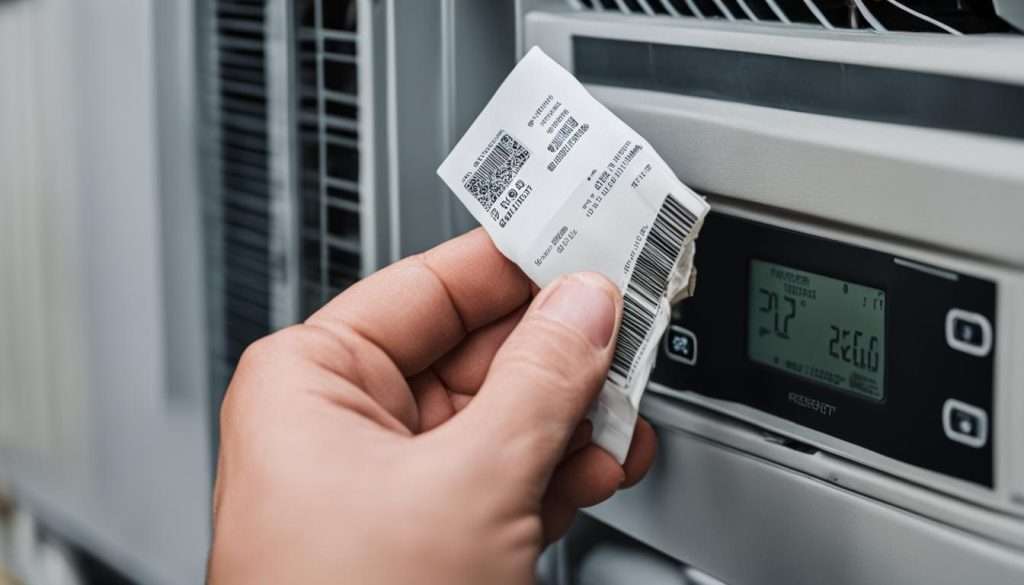When it comes to hiring HVAC technicians, you might wonder why their services come with a hefty price tag. Understanding the factors contributing to HVAC technician costs can help you make informed decisions and budget accordingly. In this article, we will explore the price breakdown of HVAC services, factors influencing HVAC technician expenses, and why HVAC techs are often expensive.
Key Takeaways:
- Specialized knowledge and expertise contribute to the higher prices of HVAC technicians.
- Factors such as installation costs, local building codes, and terrain affect the overall cost.
- Overhead expenses, including insurance coverage and fuel costs, add to the price of HVAC services.
- Supply and demand for HVAC professionals can impact prices, especially in areas with a limited supply of skilled technicians.
- The increased complexity of modern HVAC systems requires specialized knowledge, tooling, and adherence to safety requirements, leading to higher costs.
Factors Affecting HVAC Technician Costs
The cost of HVAC technicians is influenced by various factors. One of the main factors is the specialized knowledge and expertise they possess. HVAC technicians undergo extensive training and acquire years of experience to provide high-quality services. Their expertise allows them to handle complex HVAC systems efficiently and effectively, contributing to the higher prices for their services.
Another important factor is installation costs. The cost of installing HVAC systems can vary depending on local building codes, environmental factors, and the complexity of the installation. Factors such as the size of the property, the location of the HVAC system, and the type of equipment being installed can all impact the overall cost.
Overhead expenses also play a significant role in HVAC technician costs. HVAC companies have various overhead expenses, such as insurance coverage, licensing fees, and fuel costs. These expenses need to be factored into the pricing of HVAC services to ensure the company remains profitable and can provide reliable and professional services.
To summarize, factors affecting HVAC technician costs include their specialized knowledge and expertise, installation costs, and overhead expenses. By understanding these factors, you can better appreciate the value and cost associated with hiring a professional HVAC technician.
Factors that contribute to HVAC technician costs:
- The specialized knowledge and expertise acquired through years of experience and training
- The complexity of the installation, which can vary based on local building codes and environmental factors
- The overhead expenses incurred by HVAC companies, such as insurance coverage and fuel costs
Supply and Demand for HVAC Professionals
The cost of HVAC technicians is influenced by supply and demand in the industry. As the demand for HVAC services increases, especially during peak seasons, there may be a limited supply of qualified professionals available to meet the needs of homeowners and businesses. This limited supply of HVAC professionals can drive up the prices charged for their services.
Areas with a scarcity of skilled HVAC technicians often experience even higher pricing due to the imbalance between supply and demand. This is because there are fewer technicians available to handle the workload, resulting in increased competition and higher prices.
Furthermore, the expertise and experience of HVAC technicians also contribute to the higher prices. HVAC systems are complex, requiring specialized knowledge to diagnose and repair efficiently. Technicians invest years of training and experience to develop the skills necessary to tackle a variety of HVAC issues, from troubleshooting electrical problems to optimizing system performance.
The ongoing training requirements for HVAC professionals are another factor that adds to their expertise and costs. To keep up with advancing technology and industry standards, HVAC technicians must undergo regular training and certification processes. This ensures that they stay updated on the latest techniques and best practices, which ultimately benefits their customers but contributes to the overall cost of their services.
In summary, the supply and demand for HVAC professionals, coupled with their expertise, experience, and ongoing training requirements, are key factors that influence the higher prices charged for HVAC services. Understanding these dynamics can help homeowners and businesses make informed decisions when seeking HVAC assistance.
Increased Complexity of Modern HVAC Systems
The increased complexity of modern HVAC systems is one of the key factors contributing to the higher costs of HVAC labor. As technology advances, HVAC systems have become more intricate, requiring technicians to possess specialized knowledge and tooling to handle their complexities effectively. This specialized expertise adds to the overall cost of HVAC services.
Modern HVAC systems incorporate advanced features, such as variable-speed motors, zone control systems, and smart thermostats, which require technicians to stay updated with the latest industry knowledge. This ongoing training ensures that HVAC technicians can accurately diagnose and repair these complex systems, ensuring optimal performance and energy efficiency for homeowners.
Furthermore, the installation process for modern HVAC systems is more involved compared to older, conventional units. Technicians need to navigate through complex electrical wiring, integrate cutting-edge components, and configure advanced control systems. These tasks demand precision and expertise, resulting in higher labor costs.
The Importance of Safety Requirements
Safety regulations set by organizations like the National Fire Protection Association (NFPA) also contribute to the increased complexity and cost of HVAC installations. These regulations aim to protect homeowners and their properties from potential hazards associated with HVAC systems.
HVAC technicians must adhere to safety requirements such as proper electrical grounding, installation of safety controls, and adherence to ventilation standards. These measures ensure the safe operation of HVAC systems, providing peace of mind for homeowners. However, meeting these safety standards adds additional time and effort to the installation process, which ultimately translates into higher labor costs.

The combination of increased complexity, specialized knowledge and tooling, and safety requirements all contribute to the higher costs of labor for modern HVAC systems. Consequently, homeowners should be mindful of these factors when budgeting for HVAC services, and understand that the investment in quality workmanship is necessary to ensure the optimal performance and longevity of their HVAC systems.
Safety Requirements for HVAC Installations
Safety requirements are of utmost importance when it comes to HVAC installations. To ensure compliance with regulations and the safe operation of HVAC systems, HVAC technicians must adhere to the standards set by organizations such as the National Fire Protection Association (NFPA).
The inclusion of safety controls, such as smoke detectors and carbon monoxide detectors, is crucial to protect against potential hazards. These controls not only enhance the safety of the occupants but also ensure the long-term reliability and performance of the HVAC system.
Complying with safety requirements may increase the installation time and cost of HVAC systems. However, the assurance of a safe and secure environment makes it a worthwhile investment.
By carefully following safety guidelines, HVAC technicians prioritize the well-being of homeowners and their families. They ensure that the HVAC system is installed in a manner that minimizes the risk of fire, electrical hazards, and other safety concerns.
It is important for homeowners to understand the significance of these safety requirements and the value they bring. By prioritizing compliance with regulations, we can enjoy the comfort provided by HVAC systems while safeguarding our loved ones and our property.
Importance of Multiple Quotes and Negotiation
When it comes to HVAC repairs or installations, it’s crucial to consider multiple quotes from different companies. This practice allows you to compare costs and find the most reasonable option for your needs. Obtaining multiple quotes gives you a clear picture of the average cost range for the required services, helping you avoid overpaying or falling for suspiciously low offers.
Comparing costs is essential because it ensures that you get the best value for your investment. Remember that the cost of HVAC services can vary significantly based on the expertise of the technicians, the complexity of the job, and the company’s reputation. By reviewing multiple quotes, you can make a well-informed decision and select the most reputable and cost-effective option.
Benefits of negotiating repair costs
Once you have multiple quotes in hand, negotiating repair costs with HVAC companies can be a worthwhile endeavor. Many companies are open to discussing pricing options, especially if they understand that you have done your research and have other viable alternatives. By initiating negotiations, you may be able to secure a more affordable rate or additional services within your budget, providing you with a win-win situation.
Financing options for managing HVAC service costs
Managing the cost of HVAC services can be challenging, especially for large repairs or installations. Luckily, many HVAC companies offer financing options to help alleviate the financial burden. Financing options enable you to spread the cost over a period, making it more manageable for your budget. Before committing to any HVAC service, inquire with the company about the financing alternatives they offer.
By prioritizing the importance of multiple quotes, negotiating repair costs, and exploring financing options, you can ensure that your HVAC repairs or installations are both cost-effective and high-quality. Take the time to research and compare before making any decisions to secure the best value for your investment.
Conclusion
Understanding the importance of understanding HVAC costs is crucial for homeowners like you. By having a clear understanding of the factors that contribute to the cost of HVAC services, you can make informed decisions and effectively mitigate expenses.
One way to manage HVAC costs is through preventive maintenance. Regularly scheduled maintenance helps to identify and address potential issues before they become major problems, reducing the need for costly repairs. By investing in preventive maintenance, you can prolong the lifespan of your HVAC system and avoid unexpected expenses.
Another strategy to mitigate expenses is by relying on professional services. Hiring certified and experienced HVAC technicians ensures that the job is done correctly the first time, reducing the risk of future complications and additional costs. While professional services may come with a higher price tag, the long-term savings and peace of mind they provide are well worth it.
Ultimately, making informed decisions about HVAC services is key. By understanding the specialized knowledge and expertise required, the factors that influence installation costs, the importance of safety requirements, and the fluctuating demand for HVAC professionals, you can navigate the market with confidence. This knowledge empowers you to choose the most cost-effective options, compare quotes, negotiate prices, and explore financing options if needed.
If you need HVAC repair or a tech to take a look at your AC unit or heater contact D’Auria & Sons Heating and Air for help.
FAQ
Why are HVAC techs so expensive?
HVAC technicians can be expensive due to several factors. First, their specialized knowledge and expertise require years of experience and ongoing training, which adds to their costs. Second, installation costs can vary based on local building codes, weather conditions, and terrain. Finally, overhead expenses such as insurance coverage and fuel costs also contribute to the overall cost of HVAC services.
What factors affect HVAC technician costs?
The cost of HVAC technicians is influenced by various factors. Their specialized knowledge and expertise, acquired through years of experience and training, contribute to the higher prices for their services. Additionally, installation costs can vary depending on local building codes and environmental factors. Overhead expenses such as insurance coverage and fuel costs also add to the overall cost of HVAC services.
How does supply and demand affect HVAC technician prices?
The cost of HVAC technicians is also influenced by supply and demand. When the demand for services exceeds the number of qualified technicians available, prices tend to rise. This is especially true in areas where skilled professionals are scarce. Additionally, technicians’ expertise and experience, as well as the ongoing training requirements to keep up with advancing technology, contribute to the higher prices charged by HVAC professionals.
Why do modern HVAC systems lead to higher costs of labor?
The increased complexity of modern HVAC systems contributes to the higher costs of HVAC labor. Technicians require specialized knowledge and tools to handle the intricacies of these systems, leading to higher labor costs. Safety requirements, such as those set by the National Fire Protection Association, also add to the complexity and cost of HVAC installations. All these factors contribute to the overall expense of HVAC services.
What safety requirements are involved in HVAC installations?
Safety requirements play a crucial role in HVAC installations. Technicians must adhere to regulations set by organizations like the National Fire Protection Association to ensure the safe operation of HVAC systems. These requirements, such as the inclusion of safety controls, add to the installation time and cost. However, they are necessary to protect against potential hazards and ensure the long-term safety of the system.
How can homeowners manage the cost of HVAC services?
When facing HVAC repairs or installations, it is important to obtain multiple quotes from different companies. This allows for comparing costs and finding the most reasonable option. Negotiating repair costs with HVAC companies is also an option, especially if multiple quotes are obtained. Additionally, inquire about financing options that may be available to help manage the cost of HVAC services.
Why is it important to understand the cost of HVAC services?
Understanding the factors that contribute to the cost of HVAC services is important for homeowners. By being aware of these factors, such as specialized knowledge, installation costs, safety requirements, and demand for services, homeowners can make informed decisions and mitigate expenses. Preventive maintenance and professional services can also help offset the high costs of HVAC repairs. By taking these factors into account, homeowners can ensure both comfort and financial value when it comes to HVAC services.





